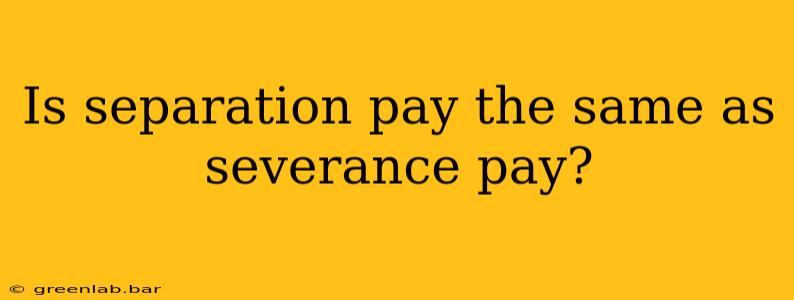The terms "separation pay" and "severance pay" are often used interchangeably, leading to confusion. While they both involve payments made to employees upon the termination of their employment, there are key distinctions. Understanding these differences is crucial for both employers and employees to ensure fair and accurate compensation.
Key Differences Between Separation Pay and Severance Pay
The primary difference lies in the reason for termination. Severance pay is typically associated with involuntary termination, often due to downsizing, restructuring, or company performance issues – situations where the employee's performance is not the primary cause for dismissal. Separation pay, on the other hand, encompasses a broader range of situations, including voluntary resignation, retirement, or involuntary termination for various reasons, including poor performance or misconduct.
Think of it this way: severance pay is a subset of separation pay. All severance pay is separation pay, but not all separation pay is severance pay.
Severance Pay: A Focus on Involuntary Termination
Severance pay is generally a legally mandated or contractually obligated payment designed to cushion the financial blow of unexpected job loss. It's often calculated based on factors such as length of service, salary, and sometimes even accrued vacation time. The specific calculation methods vary widely depending on company policies, collective bargaining agreements, and, importantly, the laws of the jurisdiction. Many countries have legislation that dictates minimum severance pay requirements.
Separation Pay: A Broader Spectrum of Exit Payments
Separation pay encompasses a much wider variety of payments made upon the end of the employment relationship. This includes:
- Severance pay (as discussed above): Payment for involuntary termination due to reasons outside the employee's control.
- Payments for voluntary resignation: Some companies offer a small payment or bonus to employees who resign, particularly if they have served for a significant period. This is less common than severance pay.
- Retirement payments: These are often separate from severance pay and are usually based on pension plans, 401(k) contributions, or other retirement savings programs.
- Payments due to termination for cause: While less frequent, some companies may offer a smaller separation payment even in cases of employee misconduct, perhaps as a compromise to avoid litigation. This is less common and generally depends on the severity of the offense.
Navigating the Legal Landscape
The legal implications of both separation and severance pay differ substantially based on location. Employment laws vary significantly from country to country and even state to state. In some jurisdictions, employers are legally obligated to provide severance pay under specific circumstances. In others, it's entirely at the discretion of the company. Consulting with an employment lawyer or reviewing relevant employment legislation is crucial for understanding your rights and responsibilities.
In Conclusion: Clarity is Key
While the terms are frequently used interchangeably, understanding the distinctions between separation pay and severance pay is essential. Severance pay is specifically linked to involuntary job loss through no fault of the employee, while separation pay covers a broader range of exit scenarios. Always refer to your employment contract, company policy, and relevant employment laws to determine what you are entitled to upon the termination of your employment. Seeking legal counsel can help navigate the complexities of these payments, ensuring a fair and transparent process.

